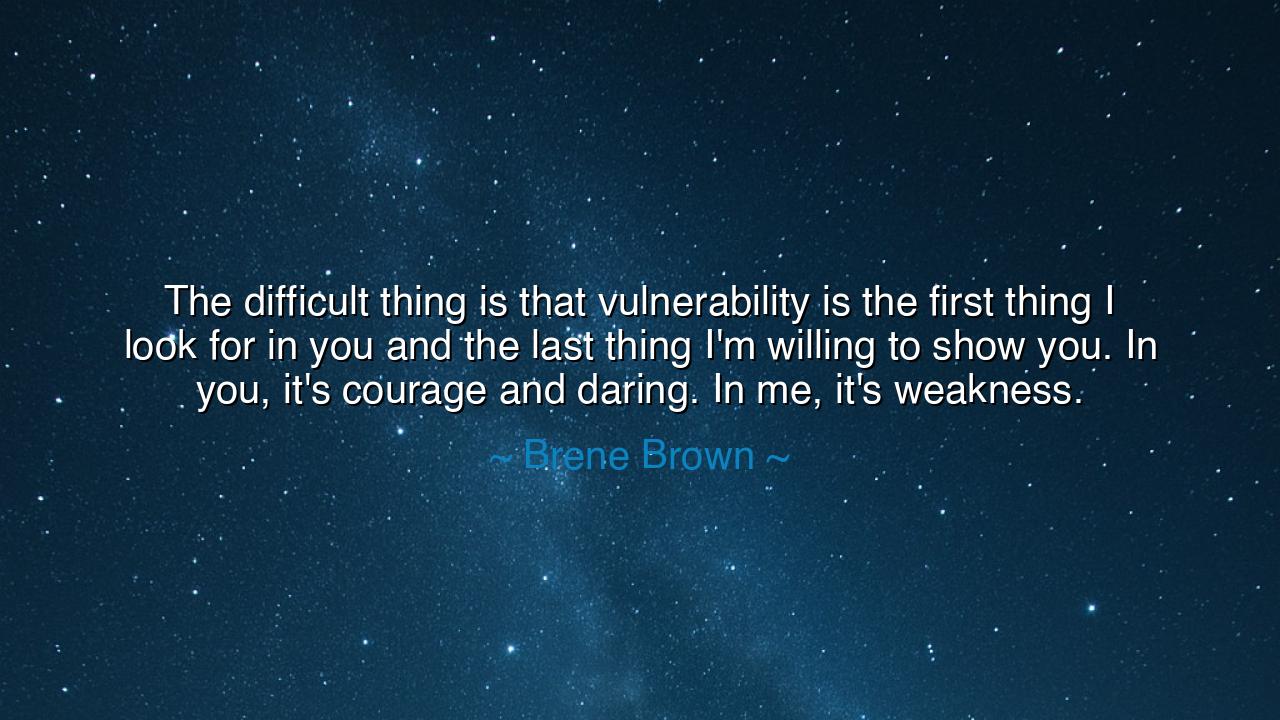
The difficult thing is that vulnerability is the first thing I
The difficult thing is that vulnerability is the first thing I look for in you and the last thing I'm willing to show you. In you, it's courage and daring. In me, it's weakness.






In her deeply human reflection, Brené Brown, the modern philosopher of the heart, reveals a paradox that has echoed through every generation: “The difficult thing is that vulnerability is the first thing I look for in you and the last thing I'm willing to show you. In you, it's courage and daring. In me, it's weakness.” These words unveil the eternal struggle between appearance and authenticity — between the armor we wear to seem strong and the trembling truth beneath it. Brown, who has devoted her life to studying vulnerability, courage, and shame, calls us to see what the ancients already knew: that true strength is not the absence of fear, but the bravery to reveal one’s wounds in a world that worships perfection.
The origin of this quote lies in Brown’s studies of human emotion and connection. Through years of research and countless interviews, she discovered a universal truth — that people long for honesty and openness from others, yet fear to reveal it in themselves. We crave genuine souls who admit their flaws, who dare to cry, to fail, to say, “I don’t know.” We find comfort in their transparency because it gives us permission to be human. Yet when the mirror turns toward us, we retreat. We fear that if others see our cracks, they will turn away. Thus, what we admire in others as courage, we condemn in ourselves as weakness.
To understand this truth, look to the story of Emperor Marcus Aurelius, that philosopher-king who ruled Rome with wisdom and restraint. In his private writings, he confessed doubts, griefs, and fears that he never showed to the world. In his people’s eyes, he was unshakable — but in his heart, he wrestled with the same storms as any man. Yet through his vulnerability, expressed in his Meditations, he reached beyond his lifetime, touching the souls of millions. For in the trembling hand that dares to write, “I too am afraid,” lies the seed of connection, the essence of humanity itself.
Brown reminds us that vulnerability is the birthplace of all that is noble — love, empathy, creativity, and courage. The warrior who fights for justice must first risk failure; the lover who bares their heart risks rejection; the artist who shares their work risks ridicule. Without vulnerability, life becomes a mask — polished, hollow, and joyless. Yet our culture teaches the opposite: hide your pain, guard your heart, and wear your strength like armor. We forget that armor also isolates; it protects the body, but imprisons the soul. To live fully, one must sometimes lay it down and meet the world as it is — unguarded, imperfect, and real.
There is a lesson too in the life of Abraham Lincoln, a man of towering moral courage, who wept often in private. During the darkest years of the American Civil War, his advisers saw him grieve openly for the fallen. Some called it weakness, but it was in those tears that his humanity shone brightest. His vulnerability became his greatest strength, for it bound him to the people he led. They saw in him not a marble figure, but a man who felt their pain as his own. From that empathy came his unbreakable resolve — proof that compassion and courage are born from the same root.
Brown’s words teach that what we hide out of fear is often what makes us most worthy of love. When we dare to show our pain, we give others the gift of seeing themselves in us. Vulnerability is not the fall of the strong, but the rise of the true. It is the bridge between souls, the path by which trust and understanding are built. Those who live without it may seem unshaken, but they live in solitude. Those who embrace it, though they may tremble, find connection deeper than any shielded heart could know.
So, my child, when you meet others, honor their openness as you would the bravery of a warrior. And when your own heart feels exposed, do not rush to cover it — for that rawness is the sign that you are alive. Speak honestly, love fearlessly, and share your wounds as freely as your triumphs. Remember always: in others, vulnerability is courage; in yourself, it must be claimed as such. For only the brave dare to be seen fully, and only they will know the profound happiness of being loved not for the mask they wear, but for the soul they reveal.






AAdministratorAdministrator
Welcome, honored guests. Please leave a comment, we will respond soon